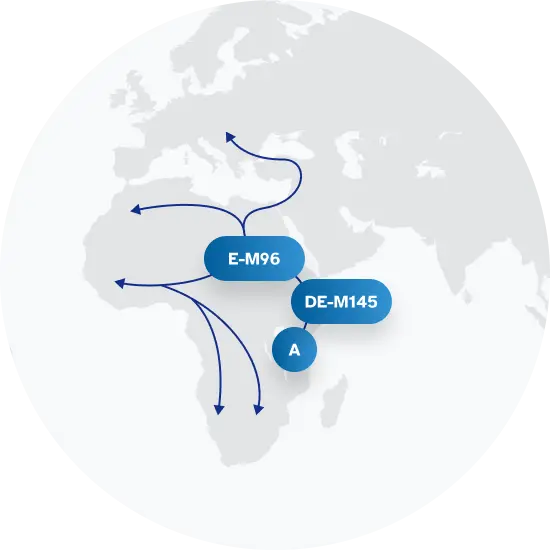Explore the Family Name Roth
How common is the last name Roth in the United States?
According to the Decennial U.S. Census data, the surname Roth has seen a slight decline in popularity over the years. In 2000, it ranked 527th, but by 2010, it had slipped to 574th place, marking a change of -8.92%. Despite this decrease in rank, the count of individuals with the Roth surname increased from 57,030 in 2000 to 58,278 in 2010, indicating a growth of 2.19%. The proportion per 100k people also decreased from 21.14 in 2000 to 19.76 in 2010, showing a drop of -6.53%.
| 2000 | 2010 | Change | |
|---|---|---|---|
| Rank | #527 | #574 | -8.92% |
| Count | 57,030 | 58,278 | 2.19% |
| Proportion per 100k | 21.14 | 19.76 | -6.53% |
Race and Ethnicity of people with the last name Roth
With regard to ethnicity, the Decennial U.S. Census data reveals some shifts for the surname Roth between 2000 and 2010. The percentage of individuals identifying as White dropped slightly from 96.27% to 94.86%, reflecting a change of -1.46%. On the other hand, those identifying as Hispanic saw a significant increase from 1.33% to 2.27%, marking an impressive growth of 70.68%. Other ethnic identities such as Asian/Pacific Islander, Two or more races, Black, and American Indian and Alaskan Native also experienced moderate increases during this period. Specifically, the proportions for these groups changed to 0.90%, 1.19%, 0.50%, and 0.29% respectively.
| 2000 | 2010 | Change | |
|---|---|---|---|
| White | 96.27% | 94.86% | -1.46% |
| Hispanic | 1.33% | 2.27% | 70.68% |
| Two or More Races | 0.99% | 1.19% | 20.2% |
| Asian/Pacific Islander | 0.72% | 0.9% | 25% |
| Black | 0.46% | 0.5% | 8.7% |
| American Indian and Alaskan Native | 0.24% | 0.29% | 20.83% |
Roth ancestry composition
23andMe computes an ancestry breakdown for each customer. People may have ancestry from just one population or they may have ancestry from several populations. The most commonly-observed ancestry found in people with the surname Roth is French & German, which comprises 36.0% of all ancestry found in people with the surname. The next two most common ancestries are British & Irish (27.7%) and Ashkenazi Jewish (15.6%). Additional ancestries include Eastern European, Scandinavian, Italian, Spanish & Portuguese, and Indigenous American.
Ready to learn more about your ancestry? Get the most comprehensive ancestry breakdown on the market by taking our DNA test. Shop 23andMe
| ANCESTRY BREAKDOWN | COMPOSITION |
|---|---|
| French & German | 36.0% |
| British & Irish | 27.7% |
| Ashkenazi Jewish | 15.6% |
| Other | 20.6% |

Possible origins of the surname Roth
Your DNA provides clues about where your recent ancestors may have lived. Having many distant relatives in the same location suggests that you may all share common ancestry there. Locations with many distant relatives can also be places where people have migrated recently, such as large cities. If a large number of individuals who share your surname have distant relatives in a specific area, it could indicate a connection between your surname and that location, stemming from either recent ancestral ties or migration.
Based on 23andMe data, people with last name Roth have recent ancestry locations in the United Kingdom of Great Britain and Northern Ireland and Ireland.
| RECENT ANCESTRY Location | Percentage |
|---|---|
| Greater Manchester, United Kingdom | 64.90% |
| Greater London, United Kingdom | 64.90% |
| Glasgow City, United Kingdom | 64.50% |
| Merseyside, United Kingdom | 64.50% |
| West Midlands, United Kingdom | 64.20% |
What Roth haplogroups can tell you
Haplogroups are genetic population groups that share a common ancestor on either your paternal or maternal line. These paternal and maternal haplogroups shed light on your genetic ancestry and help tell the story of your family.
The top paternal haplogroup of people with the surname Roth is E-V13, which is predominantly found among people with European ancestry. Haplogroup E-V13 is descended from haplogroup E-M96. Other common haplogroups include I-Z138 and R-P311, which are predominantly found among people with European and European ancestry. Other surnames with similar common haplogroups are: Wolf, Klein, Hoffman, Schneider, Snyder, Schmidt, Bauer, Becker, Fischer, Meyer.
The most common maternal haplogroups of people with Roth surname are: H1, T2b, H. These most commonly trace back to individuals of European ancestry.
 Paternal Haplogroup Origins E-M96
Paternal Haplogroup Origins E-M96
Your paternal lineage may be linked to early Balkan migrants
Haplogroup E1b1b1a1b1a migrated in large numbers from the Balkans into Europe about 4,500 years ago, triggered by the beginning of the Balkan Bronze Age. During this migration, members of haplogroup E1b1b1a1b1a mainly followed rivers connecting the southern Balkans to northern-central Europe. Technological leaps often cause lineages to grow dramatically in numbers and in geographic range. The development of Bronze technology may have given men in haplogroup E1b1b1a1b1a a competitive advantage over other men, causing haplogroup E1b1b1a1b1a to proliferate and become widespread.
Your maternal lineage may be linked to Marie Antoinette
Because it is so dominant in the general European population, haplogroup H also appears quite frequently in the continent's royal houses. Marie Antoinette, an Austrian Hapsburg who married into the French royal family, inherited the haplogroup from her maternal ancestors. So did Prince Philip, Duke of Edinburgh, whose recorded genealogy traces his female line to Bavaria. Scientists also discovered that famed 16th century astronomer Nicolaus Copernicus traced his maternal lineages to haplogroup H.

What do people with the surname Roth have in common?
Spoiler alert: it's complicated. People with the same last name are usually no more genetically similar than a randomly sampled group of people from the same population. That said, people with the same surname are more likely to have similar ancestries than randomly sampled individuals. The reason is the tendency of people with similar cultural or geographical backgrounds to preferentially mate with one another. That's why people who share a surname may be more likely to share traits and tendencies in common than people within the general population. Check out the percentages below to see the prevalences of tastes, habits, and traits of people with your surname compared with prevalences among 23andMe users.
Preferences
Traits
Habits
Wellness
Are health conditions linked to the last name Roth?
The short answer is that, if there is an association between surname and health, it's usually more about your ancestry than your name. Individuals with a given surname are no more genetically similar than the general population but often have similar ancestries. The populations of people associated with those shared ancestries often have sets of genetic variations, also known as alleles, in common. Some of those alleles are associated with a greater likelihood of developing certain diseases.
Disease variant frequency by ancestry
Disease allele frequencies in populations associated with the surname Roth are shown below. Important Note: not everyone with a disease allele will develop these health condition



























